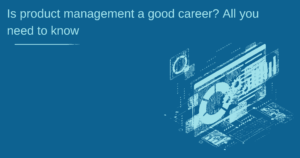Irrespective of the size and structure of a business, a product manager is accountable for the success or failure of a product. They are the ones who take a product from concept to market. Depending on the company, a product manager may be responsible for different product life cycle stages. The roles and responsibilities of a product manager are constantly evolving. As the marketplace changes, so do the functions of a product manager. This blog post will explore the roles and responsibilities of a product manager in today’s dynamic business landscape.
How Does A Product Manager Contribute To The Success Of A Company?
A product manager takes the product line of a company to its success. They work with the development team to create and improve the product and with the marketing team to promote and sell it.
The product manager is the professional who decides what features the product will have and what changes will be made to improve it. They are also responsible for managing the budget for the product and ensuring that it meets customer needs.
The role of a product manager has changed over time as technology has become more complex. In the past, a product manager has been responsible for only one aspect of a product, like its design or price. Today, however, they are often responsible for all aspects of a product’s life cycle, from conception to launch to post-launch analysis.
Skills Required For The Product Manager Role
Product managers are responsible for a product’s strategy, roadmap, and features. They work with cross-functional teams to bring products to market. The skills required for this role include the following:
Strategic Thinking: A product manager must be able to strategically think about the path of the product and align it with the company’s business goals. For instance, they need to decide which features to build and how to position the product in the market.
Analytical Skills: There is a lot of data to track when managing a product. A product manager must be able to analyse this data to make informed decisions about the product.
Roadmap Development: A proficient product manager has to develop a clear and executable roadmap for the product. For instance, they need to decide which features will be delivered.
Feature Prioritisation: It is all about balancing the needs of different stakeholders when it comes to features. A product manager must be able to prioritise features based on their impact and feasibility. For example, the marketing team wants a new feature that will take six months to develop.
However, the sales team needs a different feature that can be developed in two months. The product manager has to prioritise the features according to the needs of the company and the customers.
Cross-functional Collaboration: A product manager must collaborate with cross-functional teams effectively (e.g., engineering, design, marketing, sales) to bring products to market. Here, effective communication is key.
Project Management: Last but not least, a product manager must be able to manage the product development process from start to finish. It includes creating timelines, tracking progress, and ensuring that the product is delivered on time from conception to launch.
Top 10 Highest Paying Jobs For 2025 | Best Jobs For Future | Top High Paying Jobs 2025 | Edureka
Ready to discover the Top 10 Highest Paying Jobs for 2025? In this video, we’re uncovering the most lucrative and in-demand careers like AI & ML Engineers , Cybersecurity Engineers , Data Scientists , Cloud Architects , and Blockchain Developers! Not only will you learn about the skills you need to land these roles, but we’ll also reveal the salary potential for each job. Whether you’re looking to switch careers or climb the job ladder, this video will show you the path to a high-paying, future-proof career! Don’t miss out—watch now!
What Are The Key Responsibilities of A Product Manager? Explain In Detail
Product management is a relatively new field in India, and there are many reasons why it is the right career for you. As a proficient product manager, you will have to overlook the development and success of a product. It includes managing all aspects of the product life cycle, from ideation to launch to post-launch analysis.
You will need strong analytical skills to succeed in this role, as you will constantly be evaluating data to make decisions about your product. Making strategic plans for the product is important, as you will be responsible for creating and executing the vision for your product.
If you are aiming for a challenging and rewarding career, then product management is the right choice. Check out our Advanced Executive Certificate in Product Management to start your product management career on an insightful note.
In general, the key roles and responsibilities of a product manager are to develop and oversee the implementation of plans for new products or services. It includes everything from conducting market research and feasibility studies to developing product strategies, roadmaps and business cases.
Product managers are also responsible for managing the product life cycle, including creating go-to-market plans, coordinating with cross-functional teams during launch, and ensuring ongoing post-launch support and optimisation. They also track metrics and KPIs to assess performance and ROI, identify areas for improvement, and make recommendations for future product development.
Product managers need to have strong communication and problem-solving skills, as they will be interacting with customers, team members, and stakeholders. They must also work effectively under pressure and handle multiple tasks simultaneously.
Finally, product managers must also stay up-to-date on industry trends and the competitive landscape to develop strategies that ensure their products remain market leaders. Without a doubt, being a product manager is a challenging role, but it is also an extremely rewarding one. If you have the required skills and are up for the challenge, then product management could be your perfect career choice.
Also Read: Average Product Manager Salary In India
Roles & Responsibilities of Tech Product Manager
The roles and responsibilities of a tech product manager are many and varied but can be broadly divided into three main areas: product strategy, product development, and product marketing.
As the owner of the product vision, the tech product manager is responsible for defining the strategy for how the product will be built and delivered to customers. It includes setting the roadmap and priorities for the engineering team, working with other teams across the company to align on dependencies, and ensuring that the product meets both customer needs and business objectives.
The tech product manager also owns the product development process, working closely with engineering to bring the product vision to life. It involves writing user stories, defining acceptance criteria, overseeing quality assurance efforts, and managing beta programs.
Finally, the Tech product manager is responsible for driving the growth and adoption of the product through marketing efforts. It may include creating go-to-market plans, conducting market research, developing partnerships, and creating demand-generation programs.
Roles & Responsibilities of Business Product Manager
The roles and responsibilities of a business product manager can vary depending on the organisation but typically include

- Developing product strategy, roadmap and requirements.
- Managing the product lifecycle.
- Conducting market research and competitive analysis.
- Coordinating with cross-functional teams and communicating with stakeholders.
The business product manager may also be responsible for some organisations’ product marketing and go-to-market activities.
The development of product strategy involves understanding customers’ needs and market trends and setting direction for the product. The roadmap outlines the steps needed to achieve the product vision, while requirements define what features or functionality must be included in the final product. The product lifecycle management includes planning and executing launches, monitoring performance post-launch, and making necessary adjustments.
Conducting market research helps to understand customer needs and how they change over time, as well as identify new opportunities. Competitive analysis is used to understand what other products are available in the market and how they compare to your offering.
Cross-functional coordination is essential to ensure that all teams involved in developing and launching a product work together efficiently. Lastly, communication with stakeholders is key to keeping them updated on progress, seeking feedback and getting buy-in for decisions made.
Related Learning: Product Manager vs Project Manager
Roles & Responsibilities of Design Product Manager
Design product managers are responsible for their product line’s overall vision and strategy. They work with cross-functional teams to ensure that products are designed and developed to meet the needs of customers and the business. In addition, they are responsible for managing the product lifecycle from concept through launch and post-launch support.
Design product managers typically have a bachelor’s degree in industrial design, engineering, or a related field. Many also have experience working in product development or management roles. They are typically skilled in project management, product development process, and team leadership.
The roles and responsibilities of a design product manager typically include
- Developing product design strategy and requirements.
- Improving the aesthetics of the product throughout its lifecycle.
- Stay up-to-date with the trends and inculcate them in the design.
Design product managers often focus more on their products’ aesthetics and user experience than other product managers. As such, they may also be responsible for overseeing the work of industrial designers, user experience designers, and other design team members.
Roles & Responsibilities of Growth Product Manager
As a growth product manager, their role is to increase the adoption and usage of your product. They will need to wear many hats and be comfortable with ambiguity and change. They must be able to think strategically while also being hands-on and rolling up their sleeves when needed.
The responsibilities will include working with cross-functional teams to define, design, and ship new features that drive growth. They also manage experiments, A/B tests, and other growth initiatives. They need to understand user behaviour and analytics to make data-driven decisions deeply.
Other responsibilities may include conducting user research, managing beta programs, and working with marketing on launch plans. They should be comfortable working in a fast-paced environment and be able to juggle multiple projects at once.
A growth product manager typically has a bachelor’s degree in fields such as business, marketing, or economics. They should also have experience working in product management or a related role. In addition, they should have strong analytical and problem-solving skills.
Also Read: How To Become A Product Manager? A Complete Career Guide
Why is Product Management the Right Career For You In India?
According to a recent study, there is a shortage of product managers in India. As the country’s economy continues to expand, the demand for product managers is also propelling. As a result, there is a massive demand for talented product managers in India.
Product management is a rewarding career that offers many challenges and growth opportunities. It requires a blend of strategic thinking, business acumen, and technical skills. And it offers a great opportunity to work in a fast-paced and rapidly growing industry. For the most rewarding career, product management is the right choice for you.
Some thought-provoking stats on the product manager’s profile:
- The average annual salary for a product manager in India is Rs. 1,015,000 annually.
- There are currently over 4,000 openings for product manager roles in India.
- The demand for product managers is expected to grow by 22% in the next five years.
- There are currently over 200,000 product managers in India.
As you can see, an enormous demand for product managers in India will continue to grow. A gap in the product management field needs to be closed to keep up with the demand. India offers an excellent opportunity for those who want to enter product management. The global market for product management is expected to reach $2.4 trillion by 2025, and India will play a pivotal role in that growth.
So, if you’re looking for a rewarding career that offers plenty of challenges and opportunities for growth, then there is nothing more rewarding than product management.
Conclusion
Product managers are responsible for every aspect of the product, including its development, launch, and eventual removal from the market. A product manager must have a deep understanding of their customer base and be able to identify gaps in the market that their product can fill. They have to work with a team of developers to bring their vision for the product to life and then manage its release into the market.
In India, the roles and responsibilities of a product manager vary depending on the organisation. However, the typical roles and responsibilities of a product manager in India include the following:
- Developing product strategy, roadmap and requirements.
- Conducting market research and competitive analysis.
- Managing the product lifecycle.
- Overseeing the work of cross-functional teams.
If you have the skills and experience required for the job, then product management is your go-to career in India. But where do you start? We have a brilliant course that will teach you all the basics of product management and help you transition into this exciting and challenging field.
So what are you waiting for? Check out our Advanced Executive Certificate in Product Management which offers you the flexibility and convenience to study at your own pace and earn a globally recognised credential.
More Information:
Product Manager’s Salary in India: Key Insights in 2022
What are Product Management Courses? Why are They Crucial?






_1668670867.jpg)





















